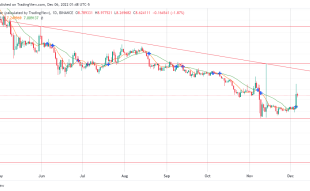Join Our Telegram channel to stay up to date on breaking news coverage
Adrian Butkus, a 43-year-old father of two, put $600,000 — much of his life savings — into an account at BlockFi, a cryptocurrency trading firm, in early November. BlockFi had marketed the account as risk-free, with a 6.5 percent interest rate, which was higher than Mr. Butkus could get elsewhere.
Mr. Butkus asked BlockFi for his money back just days later, as the collapse of the cryptocurrency exchange FTX shook the entire crypto industry. However, due to its close financial ties to FTX, the firm has suspended customer withdrawals. BlockFi, too, declared bankruptcy in late November.
Mr. Butkus has no idea when or if he will see his money again. He is one of millions of individual investors worldwide who have poured money into digital assets, believing that the cryptocurrency industry was a secure financial system. They were unconcerned about Bitcoin and other cryptocurrencies’ volatility and large price swings. Many people were surprised to learn that the firms where they deposited their money lacked the basic safeguards provided by a brokerage or a bank.
Customers came to believe that companies like FTX were safe places to deposit cash in exchange for cryptocurrency as they adopted the marketing tactics and girth of mainstream financial firms. The fact that some of these companies were backed by well-known venture capital and other funds only added to their allure.
“It angers me,” Mr. Butkus said. “Now I’m fighting to reclaim some of my money.”
Cryptocurrency firms, led by FTX, have exploded into the mainstream in recent years, pitching their products as stable and safe investments in extensive advertising campaigns. Unlike traditional banks and brokerages, which are restricted in what they can say, crypto firms are not bound by the same restrictions.
No guarantees
Joshua Fairfield, a technology law professor at Washington & Lee Law School says
These companies all give the impression of bank-like security. These companies want customer trust but without the responsibilities that come with being a regulated financial entity. And that simply does not work.
Furthermore, if a bank or brokerage fails, there are government-guaranteed funds to ensure that investors get their money back in most cases. For the most part, the cryptocurrency industry lacks such safeguards. And, with the companies in bankruptcy and the value of some crypto assets uncertain, ordinary customers are at the back of a long line to get their money back, trailing large trading firms and lenders.
Mr. Butkus stated that he invested with BlockFi despite knowing that the accounts were not insured. He lent BlockFi his $600,000 for six months in exchange for a 6.5 percent return. BlockFi converted the funds into a digital asset, which it used to conduct cryptocurrency trading.
He took BlockFi’s marketing materials and sales agents at their word when they said his investment was safe and redeemable at any time.
“They sold it to me as if there was no risk,” Mr. Butkus said, adding that he had no idea BlockFi, which had borrowed money from FTX, was so inextricably linked to the exchange.
Mr. Butkus, a self-employed businessman, invested a large portion of the proceeds from the recent sale of his Plainfield, Illinois, home. He hoped that the interest on his BlockFi loan would increase his savings, which he would then use to build a new home for his family. Now he’s wondering where his family, who are currently staying with his in-laws, will live in the long run.
FTX and BlockFi lawyers did not respond to requests for comment.
FTX, founded by Sam Bankman-Fried and once a crypto industry behemoth, imploded last month after some major trading firms withdrew funds amid allegations that the exchange used billions of dollars in customer deposits to bail out Alameda Research, the crypto trading firm he co-founded. The exchange’s demise was all the more shocking because FTX had gained legitimacy through a splashy advertising campaign portraying its product as safe, fun, and simple to use.
Federal authorities in New York are now determining whether criminal charges should be filed against Mr. Bankman-Fried and others in connection with the company’s demise and the potentially improper use of customer deposits. During a media blitz this week, Mr. Bankman-Fried insisted that he never intended to defraud anyone and was unaware of how much customer money had been transferred to Alameda.
Frank Friemel, 39, is one of the FTX customers who are wondering if they will receive any of their money back from the now-bankrupt exchange. Mr. Friemel said he knew FTX was unregulated when he opened an account in March, but he wasn’t concerned.
He reasoned that, as the world’s second-largest cryptocurrency trading platform, FTX had the financial backing of well-known professional investment firms such as Sequoia and SoftBank.
“I’m a seasoned investor, and I knew who was investing with them,” said Mr. Friemel, a Jena, Germany-based technology professional. “If big investors are putting money into them, they must believe in the company.”
Mr. Friemel attempted to withdraw his funds on Nov. 8 after hearing reports that FTX might fail, but it was too late. He claimed to have received notification that his withdrawal was being reviewed, but he never heard from FTX again. Mr. Friemel declined to disclose his losses but stated that the collapse of FTX had resulted in a “erosion of trust” in cryptocurrency.
Because FTX is based in the Bahamas, the majority of its clients are from Europe, Asia, and well-known tax havens such as the Cayman Islands and British Virgin Islands. According to its bankruptcy filings, only 2% of its customers are in the United States, where they trade through FTX US, a subsidiary.
Customers were told they could withdraw their money in the days leading up to FTX’s bankruptcy filing. It’s unclear how many did; FTX US has since declared bankruptcy as well.
Mashood Alam, a Pakistani actor who lives in North Hollywood, California, and was an FTX US customer, said he wasn’t fully aware of the company’s problems until the bankruptcy filing. Mr. Alam, 32, said he hoped to recoup $20,000, but the ordeal has soured him on cryptocurrency. He had intended to use the funds to assist in the payment of a lawyer to work on his naturalization and citizenship application. Mr. Alam has now stated that he will have to find another way to raise the funds.
Scott Jerutis, 58, a real estate broker in Queens, said he has about $33,000 in Ethereum in a frozen BlockFi account. He described himself as an experienced investor who had previously made profitable crypto trades, and he acknowledged that losses were a part of the game.
“I never thought if you had a debacle like this, they wouldn’t let you withdraw your funds,” he added. Mr. Jerutis stated that he now believes that regulation is required to protect customer funds.
Few legal options available
Angry investors are only now discovering that they have few options. Andrew Stoltmann, a securities litigation lawyer, said that even before the FTX collapse, his firm had been receiving about ten calls per day — “ever since the crypto winter began,” he said, referring to the early wobbles in the market last spring as investors fled risky assets.
Mr. Stoltmann said that many customers want to know if they can sue to recover money that has been lost or stolen. He claims that because traditional Wall Street firms have refrained from lending to crypto firms, there are few other stable financial institutions to turn to.
So far, about two dozen people have filed bankruptcy claims in order to reclaim money they lost on FTX. The majority are from Taiwan, and their losses range from a few thousand dollars to tens of thousands.
Chen Mei-Sha, one of those customers, filed a claim for $5,600. She began to suspect that most of Mr. Bankman-Fried’s Twitter posts and speeches were lies after FTX stopped allowing withdrawals, she said in an email. Ms. Chen described herself as a housewife who had previously invested in cryptocurrencies on three different trading platforms and believed that FTX had “misappropriated” customer funds.
FTX was especially successful in cultivating its brand. It signed multiyear naming-rights deals worth more than $100 million with a professional basketball arena in Miami and a football stadium at the University of California, Berkeley, beginning last year. Major League Baseball and the Golden State Warriors basketball team have also signed marketing agreements with the company.
Celebrities recruited as brand ambassadors
FTX signed up a number of well-known athletes and celebrities as “brand ambassadors,” including Stephen Curry, Tom Brady, Gisele Bündchen, and Larry David, who made humorous TV commercials or other advertisements for the company. Mr. Brady and Ms. Bündchen, who were married at the time, are seen in one of the company’s most well-known commercials, calling a large number of friends — and even some enemies — with a simple question: “Are you in?”
Crypto. FTX. You in?
According to EDO, a data and analytics company, FTX has spent $60 million on TV advertising since September 2021, with its most recent commercial featuring Mr. Brady airing from September 11 to November 4.
According to Nathaniel Whittemore, FTX’s director of marketing, the U.S. marketing and ad campaign was primarily focused on “brand building” and raising the “profile of FTX and crypto overall.”
Big marketing and sports stadium branding campaigns, according to Eric Goldman, a professor at Santa Clara University School of Law and the director of its High Tech Law Institute, are a popular way for tech start-ups to convey that their businesses are in it for the long haul. Mr. Goldman explained,
It sends a signal to consumers that the advertiser has enough money and is willing to stake enough of its fortune on advertising to say that it will be around
Related
- Coinbase CEO Brian Armstrong flabbergasted FTX’s SBF isn’t in custody already
- In the first significant fallout from the collapse of FTX, cryptocurrency business BlockFi files for bankruptcy
- The collapse of FTX was criminal, not accidental
Join Our Telegram channel to stay up to date on breaking news coverage


